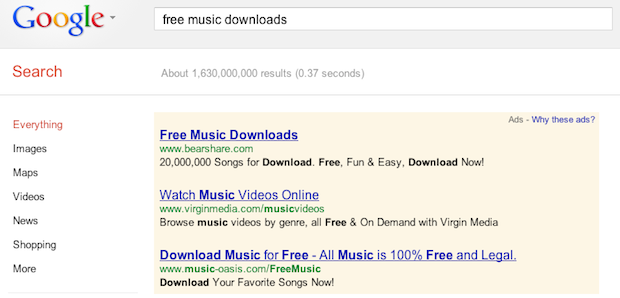Google's SOPA press stunt: Can we truly hold them liable?

Record labels are some of the most influential players in the SOPA debate. One of their latest moves has been to criticise Google for "not doing enough" to tackle online piracy and illegal downloads.
A recent report by the International Federation of the Phonographic Industry (IFPI), who represents music labels globally, stated that Google has not been tough enough in tackling illegal file-sharing.
The IFPI said guarantees Google had made about copyright infringement 12 months ago "remained unfulfilled", although the search engine giant has made "modest steps" to limit illegal behaviour.
These measures included Google closing down almost 150,000 accounts that were using sponsored searches to advertise counterfeit goods.
In response, Google declined to comment on what it called a "press stunt".
Attempts to halt online piracy have largely failed. Every time one provider is closed down, another springs up in its place. The SOPA act would allow copyright holders private rights of action to take intermediaries to court -- including payment services, search engines, personal websites and Internet service providers.
Should search engines be held liable for facilitating access to potentially copyrighted material?

(Source: ZDNet)
Is it a search engine's job to regulate and censor?
Search engines can enable users to access pirate content. The threat of lawsuits may be enough to deter services like Google from linking to anything but legitimate, 'authorised' links. Once you begin censoring what information an Internet user is allowed to see online, we're talking the Chinese Firewall 2.0.This could be the door stop for governments to become the authority on what we're allowed to click.
Verisign is an American company that controls .com, .net and .org domain names. If they are under the SOPA thumb, then in turn, so is any company in the world that uses one of these domain extensions.
The only way to keep out of their grasp would be to register an alternative name, but this in the future still may not keep your business safe.
Restricting access to only 'authorised'websites would not necessary work. What if a website containing legitimate music purchases also includes a comment section, where one user has posted a link to a pirate version? With one user-generated comment, both the legitimate website and the search engine instantly become liable.
Using simply this analogy, you can see the potential snowball effect. No service where users can post information and generate content can be considered safe.
The only option would be to completely remove any interactive components of every website online. The Internet may become little more than a 'read only' resource.
Would it just be the removal of links to pirated material?
Not necessarily. In 2002 and under threat of a legal battle Google de-indexed links to anti-Scientology websites, based on copyright infringement.The removal was short-lived. The lawyers may have filed a DMCA, but a resulting backlash from free-speech advocates and the tech community quickly reinstated the sites, and they are still alive and well today.
The debate was complicated. It could be argued that the cry of copyright infringement may have simply been the means in which to remove a chief online critic of an organisation.
There's no guarantee that the cry of copyright infringement will always be innocent -- perhaps you could use it to take down a competitor or critic yourself. Under legal threats, there's little room for a search engine to maneuver on such a potentially large scale.
Could this concept be taken much further with SOPA?
Are they profiting from piracy?
By directing results, major search engines could also potentially be earning revenue from sponsored adverts. To be honest, as much as many SOPA-supporting officials would like to paint online services with the 'You're making money from the theft of our work!' brush, I find this argument extremely weak.In the grand scheme of things, just how much traffic is based on pirated content searches? In comparison to legal, innocent search results, I doubt the 'profit' Google makes even dents their annual net profit margins.
Are there alternatives to a SOPA stamp-out?
In a recent SOPA hearing, Katherine Oyama, Google's copyright counsel, outlined measures that the search engine has already put in place to contribute to solutions to illegal downloads."The only long-term way to beat piracy online is to offer consumers a more compelling legitimate alternative," she stated, using the example of how Google creates revenue for record labels by selling adverts around their music videos on YouTube.
Simply put, piracy online will not be stamped out, in the same way that it will not be stopped in the physical world. Create convoluted legislation, and before long, a developer or Internet specialist will devise a way around it.
In fact, some software already exists. It may not be fully compatible or working yet, but the meaning is clear. Even before the legislation has been passed, developers are already creating and releasing means to circumvent SOPA.
It is not a search engine's duty to protect copyrighted material. It is to allow access to information on a global scale.
Blaming a search engine for copyright infringement is like blaming a highway for a car crash. It is a service provider, that people use how they see fit. But it's not to blame for the way someone searches -- or drives.
Related: